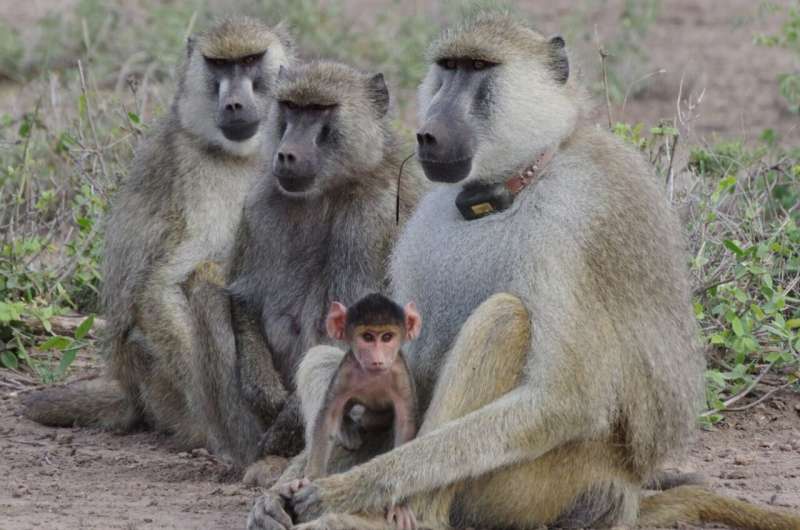In a groundbreaking study published on July 5, 2025, by researchers from the University of Notre Dame, it has been revealed that strong father-daughter relationships in baboons can significantly impact the lifespan of female offspring. This research, published in the Proceedings of the Royal Society B, highlights the unique role fathers play in the survival of female baboons, a finding that could shed light on the evolutionary roots of parental care in mammals.
The study, conducted in the Amboseli ecosystem of East Africa, analyzed the interactions between 216 female baboons and their fathers. It found that daughters who maintained a close relationship with their fathers, either through co-residence or frequent interaction, lived two to four years longer than those with weaker paternal bonds. This discovery underscores the importance of paternal presence in the early life stages of female baboons.
Understanding Paternal Influence in Baboons
Unlike many mammals, where paternal care is minimal, the study suggests that baboon fathers contribute significantly to their daughters’ survival. Elizabeth Archie, professor of biological sciences at Notre Dame and corresponding author of the study, explained, “Male baboons tend to reach their peak reproductive success when they’re young adults. But once they’ve had a few kids and their condition declines, they sort of slide into ‘dad mode,’ where they don’t disperse as much and they don’t try as hard to mate. Then they have time to invest in and hang out with their kids.”
The research showed that about one-third of the studied female baboons lived in the same social group as their fathers for three years or more. In contrast, the remaining two-thirds had fathers who either left the group or died within their daughter’s first three years of life. This distinction was crucial in understanding the long-term benefits of paternal presence.
Grooming and Social Bonds
Researchers also delved into the grooming habits of juvenile females, noting that grooming serves both hygienic and social bonding purposes. Archie compared this behavior to the human equivalent of “sitting down, having a cup of coffee and a good chat.” The study found that daughters with strong paternal relationships exhibited more robust grooming habits, further strengthening their social bonds.
Interestingly, the study revealed that strong relationships between juvenile females and other adult males did not predict adult survival. This could be attributed to the protective role fathers play in conflicts, often intervening on behalf of their offspring and expanding their social networks.
“Males seem to sort of expand a child’s social network, as they can be popular members of their social group. Lots of baboons are coming up and interacting with the male. So an infant who’s hanging out near a male has more diverse social interactions than if they’re only hanging out with mom,” Archie said.
Implications for Evolutionary Biology
While mammalian fathers are often perceived as minimal contributors to offspring care, this study challenges that notion, at least in the context of baboons. Archie believes these findings may offer insights into the evolutionary roots of human parental care, suggesting that even seemingly minor contributions by males can have significant consequences.
The research is part of the Amboseli Baboon Research Project, one of the longest-running primate studies in the world, co-directed by Archie, Susan Alberts from Duke University, and Jenny Tung at the Max Planck Institute for Evolutionary Anthropology. The study’s co-authors also include David Jansen at the University of Wisconsin-Madison and J. Kinyua Warutere at the Amboseli National Park in Kenya.
Future Research and Broader Implications
This study opens new avenues for understanding the role of paternal care in non-human mammals and its implications for human evolution. As researchers continue to explore these dynamics, the findings could influence how we perceive and study parental roles across species.
More information on this study can be found in the paper titled “Early-life paternal relationships predict adult female survival in wild baboons,” authored by David J. Jansen et al., in the Proceedings of the Royal Society B: Biological Sciences.
 Father-Daughter Bonds Extend Lifespan in Female Baboons, Study Finds
Father-Daughter Bonds Extend Lifespan in Female Baboons, Study Finds Father-Daughter Bonds Extend Lifespan in Female Baboons, Study Finds
Father-Daughter Bonds Extend Lifespan in Female Baboons, Study Finds Father-Daughter Bonds Extend Lifespan in Female Baboons, Study Finds
Father-Daughter Bonds Extend Lifespan in Female Baboons, Study Finds Father-Daughter Bonds Enhance Longevity in Female Baboons, Study Finds
Father-Daughter Bonds Enhance Longevity in Female Baboons, Study Finds Moon Phases Explained: What to Expect on July 6, 2025
Moon Phases Explained: What to Expect on July 6, 2025